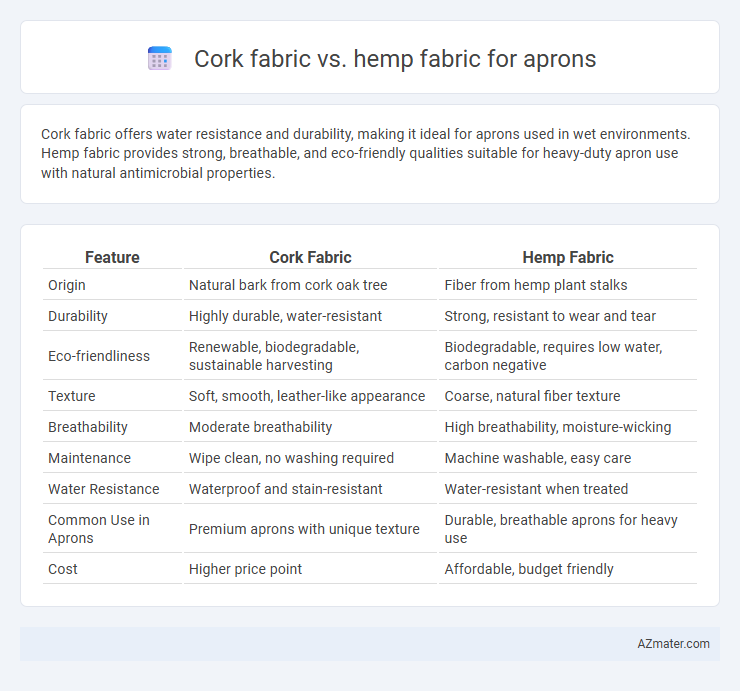Cork fabric offers water resistance and durability, making it ideal for aprons used in wet environments. Hemp fabric provides strong, breathable, and eco-friendly qualities suitable for heavy-duty apron use with natural antimicrobial properties.
Table of Comparison
| Feature | Cork Fabric | Hemp Fabric |
|---|---|---|
| Origin | Natural bark from cork oak tree | Fiber from hemp plant stalks |
| Durability | Highly durable, water-resistant | Strong, resistant to wear and tear |
| Eco-friendliness | Renewable, biodegradable, sustainable harvesting | Biodegradable, requires low water, carbon negative |
| Texture | Soft, smooth, leather-like appearance | Coarse, natural fiber texture |
| Breathability | Moderate breathability | High breathability, moisture-wicking |
| Maintenance | Wipe clean, no washing required | Machine washable, easy care |
| Water Resistance | Waterproof and stain-resistant | Water-resistant when treated |
| Common Use in Aprons | Premium aprons with unique texture | Durable, breathable aprons for heavy use |
| Cost | Higher price point | Affordable, budget friendly |
Overview of Cork Fabric and Hemp Fabric
Cork fabric, derived from the bark of cork oak trees, is a sustainable, water-resistant, and durable material ideal for aprons that require easy cleaning and a unique texture. Hemp fabric, made from the fibers of the hemp plant, offers superior breathability, antimicrobial properties, and strength, making it a popular choice for aprons needing long-lasting wear and eco-friendly credentials. Both fabrics provide environmentally conscious alternatives to traditional textiles, with cork excelling in water resistance and hemp in comfort and durability.
Material Source and Sustainability
Cork fabric is derived from the bark of the cork oak tree, harvested sustainably without harming the tree, making it a renewable and biodegradable material. Hemp fabric comes from the fibers of the hemp plant, known for its rapid growth, low water usage, and minimal pesticide requirements, contributing to its eco-friendly profile. Both materials offer durable, sustainable alternatives for aprons, but hemp's agricultural efficiency and cork's natural regeneration highlight their unique environmental advantages.
Durability and Strength Comparison
Cork fabric and hemp fabric both offer exceptional strength and durability for aprons, with cork fabric being naturally water-resistant and abrasion-resistant due to its dense cellular structure. Hemp fabric is renowned for its tensile strength and long-lasting wear, often outperforming cotton in resisting tears and punctures, making it ideal for heavy-duty use. While cork fabric provides a unique lightweight and flexible texture, hemp fabric delivers superior toughness and resilience, ensuring long-term durability under rigorous conditions.
Water Resistance and Stain Protection
Cork fabric offers superior water resistance compared to hemp fabric due to its natural waxy coating, making it ideal for aprons used in wet environments. Hemp fabric, while breathable and durable, absorbs moisture more readily and requires treatments to achieve similar stain protection. Both fabrics provide eco-friendly options, but cork's inherent water-repellent properties make it particularly effective for apron stain resistance.
Comfort and Breathability
Cork fabric offers a unique combination of water resistance and durability but tends to be less breathable, which may result in reduced comfort during extended wear. Hemp fabric provides excellent breathability and natural moisture-wicking properties, making it ideal for maintaining comfort and airflow in apron use. Choosing hemp aprons ensures greater softness and temperature regulation, while cork aprons excel in sturdiness and easy cleaning.
Maintenance and Cleaning Requirements
Cork fabric aprons require minimal maintenance, needing only a damp cloth wipe to remove stains and dirt due to their water-resistant and durable surface. Hemp fabric aprons demand more frequent washing, as they absorb liquids and odors more readily but maintain strength and softness with regular machine washing at moderate temperatures. Both materials benefit from air drying to preserve fabric integrity and prolong apron lifespan.
Style and Visual Appeal
Cork fabric offers a sleek, modern aesthetic with a smooth, leather-like texture and a rich natural grain that enhances apron style. Hemp fabric presents a rustic, organic appearance with a coarse weave that adds a vintage charm and earthy tone to aprons. Both materials provide unique visual appeals, with cork showcasing sophistication and hemp emphasizing eco-friendly, artisanal craftsmanship.
Allergen and Skin Sensitivity Considerations
Cork fabric is hypoallergenic and naturally resistant to bacteria and fungi, making it ideal for individuals with sensitive skin or allergies when used in aprons. Hemp fabric is also hypoallergenic, breathable, and antimicrobial, reducing the risk of skin irritation and allergic reactions. Both materials offer skin-friendly properties, but cork's smooth texture may provide added comfort for those prone to skin sensitivity.
Cost and Market Availability
Cork fabric typically costs more than hemp fabric due to its unique harvesting process and limited supply, making it less common in the apron market. Hemp fabric offers a more affordable and widely available option, supported by sustainable farming practices and increasing global production. Market availability favors hemp, with numerous suppliers and eco-conscious brands incorporating it into aprons, while cork fabric remains niche and premium-priced.
Environmental Impact and Eco-Friendliness
Hemp fabric for aprons offers superior environmental benefits due to its rapid growth, low water usage, and ability to improve soil health, making it highly sustainable. Cork fabric is biodegradable and harvested without tree cutting, yet its production involves energy-intensive processes that may reduce overall eco-friendliness. Choosing hemp aprons supports renewable agriculture and reduces carbon footprint more effectively than cork alternatives.

Infographic: Cork fabric vs Hemp fabric for Apron
 azmater.com
azmater.com